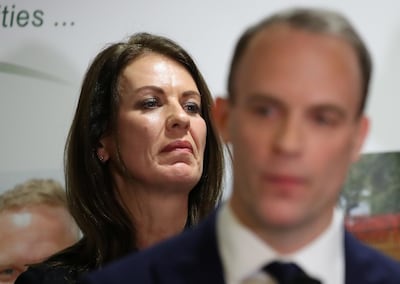Boris Johnson has the opportunity to reset the UK’s place in the world for a generation when he takes the country out of the European Union early in 2020.
The move could lead to a profound shift in its trading partners, reset its foreign policy goals and change the nature of the relationship with its closest neighbours.
The sweeping victory for Mr Johnson’s ruling Conservative Party clears the way for him to push through a divorce deal struck with the EU that was blocked last year by a bitterly-divided parliament.
“We will get Brexit done on time by January 31 - no ifs, no buts no maybes,” said Mr Johnson after a campaign dominated by his slogan to “Get Brexit Done”.
Despite the focus on January 31, the date is a staging post on the road to a full Brexit.
The UK and EU will continue their current trading arrangements until December 31, 2020, while they try to negotiate and ratify a future deal to put in its place. Mr Johnson on Friday spoke of "redoubling our trading relationship".
The European Parliament's Brexit co-ordinator Guy Verhofstadt said that Brexit with Thursday’s election effectively confirming the referendum decision of 2016. “The EU must now focus on building a new close, fair and lasting partnership with Britain. It is in our common interest,” he tweeted.
Oliver Patel, a research associate at the UCL European Institute, wrote in The Conversation website that the government is likely to pursue a “relatively distant trading relationship” with the EU and potentially prioritising trade agreements with other countries.
US President Donald Trump has repeatedly spoken of striking a trade deal with the UK separate from the EU, but critics have said any deal risks weakening food and medicine regulations.
“Britain and the United States will now be free to strike a massive new Trade Deal after BREXIT,” the president tweeted on Friday. “This deal has the potential to be far bigger and more lucrative than any deal that could be made with the EU. Celebrate Boris!”
If the UK and EU fail to renegotiate the decades of joint trade and regulations within 11 months then the two sides face a break without one in place. British businesses have warned that leaving without a deal would have dire impact on the UK’s economy.
But Mr Johnson has said the date would not be changed after the EU cast doubt on the ability of the two sides to do a deal within the timescale. The so-called transition period can be extended for either one or two years.
“We will negotiate a trade agreement next year … and we will not extend the implementation period beyond December 2020,” said the Conservative Party manifesto.
But with his position unassailable given his large win, the prime minister has the political capital to potentially postpone the date if they don’t succeed.
The Chancellor, Sajid Javid, dismissed concerns that a deal could not be done within the time. “No-one needs to worry about No Deal because we have a solid majority, a functioning government and we said we would get Brexit done with a deal and that’s exactly what we’re going to do,” he said.
The prime minister’s hand has been further strengthened by the rejection of anti-Brexit candidates, who failed to make any in-roads. Jo Swinson, the leader of the most pro-European Union party the Liberal Democrats, lost her seat forcing her to step down.
High-profile defectors to the Liberal Democrats from the two main parties all failed to win seats, along with former ministers who were forced to quit after opposing Mr Johnson’s Brexit policies.
It meant that high-profile Brexiteers who were seen as vulnerable to an anti-Brexit surge – including Foreign Secretary Dominic Raab and ex-leader Iain Duncan Smith – all safely retained their seats.
The campaign in Mr Raab’s constituency was particularly bitter with Mr Raab criticising opponents “gutter” campaigning in his acceptance speech after the count at Sandown Racecourse in Surrey, a traditional Conservative party heartland south of London. “I think the key thing now is to unite the country,” he said.
His Liberal Democrat challenger, Monica Harding, was seeking to harness the strong anti-Brexit vote in the area from the 2016 referendum but fell some 3,000 votes short of overturning Mr Raab’s 23,000 majority.

“I have no idea what he’s talking about,” she said about his reference to ‘gutter’ campaigning. “He should be trying to help heal the country’s divisions.”
The Liberal Democrats were left with just 11 seats – one fewer than they secured at the last election in 2017.
The Conservative manifesto claimed that successfully completing Brexit would allow the UK to do more on the international stage.
“We will continue to be an outward-looking country that is a champion of collective security, the rule of law, human rights, free trade, anti-corruption efforts and a rules-based international system,” it said.
But the government faces questions about how it will pay for more foreign commitments. The UN trade agency said warned in September that leaving the EU without a trade deal would cost Britain at least $16 billion in lost EU sales.


